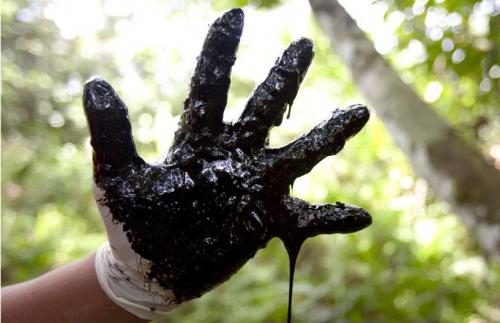29 Nobel Laureates demand that Chevron face justice for Amazon pollution
- Declaración

We, the undersigned 29 Nobel Prize Laureates, support Steven Donziger and the Indigenous peoples and local communities in Ecuador in their decades-long work to achieve environmental justice over pollution caused by Chevron. We call for a judicial remedy for the legal attacks orchestrated by Chevron against Donziger and for the defamation of his character.
While the coronavirus pandemic has rightfully captured the world’s attention now, we cannot lose sight of the ongoing importance of protecting the planet’s environmental defenders. For as long as people have defended the environment, they often have faced great personal risk. In recent years, multifaceted attacks against environmental defenders have grown. These include physical assaults and murder, defamation campaigns, digital security threats, and corporate abuse of the judicial system.
One of the most egregious cases of judicial harassment and defamation involves Chevron’s legal assault on Steven Donziger and his Ecuadorian colleagues.
From 1964 to 1990, the oil company Texaco knowingly and willfully polluted the Ecuadorian Amazon. During that period, the company deliberately dumped over 16 billion gallons of toxic wastewater, spilled approximately 17 million gallons of crude oil and left hazardous waste in hundreds of open pits it had dug in the forest floor. When Chevron agreed to purchase Texaco in 2000, it also became owner of “the Amazon Chernobyl” created by that company.
In a 1993 suit against Texaco, some 30,000 indigenous people and campesino farmers sought restitution from the company. Fearing a jury trial in the US, Chevron, the new owner, petitioned that the case be heard in Ecuador. Contrary to its expectations, Chevron was found guilty in the case in 2011 and in all appeals leading to the Ecuadorian Supreme Court, which in 2013 upheld the previous judgments. Chevron was ordered to pay $9.5 billion to clean up its mess.
Rather than do so, Chevron sold its Ecuadorian assets, left the country and began a high-powered attack against the victims along with one of their attorneys, Steven Donziger. Hiring public relations firms and approximately 2,000 lawyers, including those from the “rescue squad” firm of Gibson Dunn, Chevron threatened the victim communities with a “lifetime of litigation” and vowed to fight the judgment “until Hell freezes over, and then fight it out on the ice.”
In the case of attorney Donziger, who refused to give up the fight to see justice done on behalf of the Amazonian victims, Chevron and a pro-corporate judicial ally, US District Judge Lewis A. Kaplan, manufactured “contempt” charges against him, largely because he refused to comply with the judge’s unprecedented order that would have allowed Chevron access to Donziger’s confidential client communications on his computer and phone.
For this charge of contempt, which is being treated as a misdemeanor, Donziger has now been put under pre-trial house arrest for an unheard-of eight months — far longer than the longest sentence ever imposed on a New York lawyer for contempt — and finds himself and his family nearly destitute from the ongoing attacks of Chevron. According to one of the oil company’s hired PR firms, Chevron’s long-term strategy is to “demonize Donziger.”
Chevron, worth over $200B USD, has already spent some $2B USD fighting the Ecuadorian judgment. Less about the value of the judgment, the point for Chevron is to intimidate and crush those who seek justice and compensation for the degradation of their ancestral lands. But to read “The Chevron Way” on the company’s website, one would think it was reading about a different company entirely.
One of the values espoused in Chevron’s “Way” says: “Our company’s foundation is built on our values, which distinguish us and guide our actions to deliver results. We conduct our business in a socially and environmentally responsible manner, respecting the law and universal human rights to benefit the communities where we work.”
Clearly said, these words are not indicative of Chevron’s values. They have nothing to do with Chevron’s treatment of the tens of thousands of Ecuadorians living in its toxic mess, nor with the lawyer seeking to protect the rights of those people to live in a clean environment.
Environmental activism in many countries results in murder. Chevron’s strategy is death by a thousand cuts through the manipulation of a legal system it has managed to stack in its favor. Its goal is to intimidate and disempower the victims of its pollution and a lawyer who has worked for decades on their behalf.
As Greta Thunberg and the millions around the world protesting with her seek to raise awareness about the state of the planet and demand their right to live in a world with an environmentally sound future, we must also stand with and speak out for those leading struggles on the front lines.
We call on everyone fighting to save our planet to join with us in raising awareness about and support for the Ecuadorian plaintiffs and their attorney, Steven Donziger.
Please visit makechevroncleanup.com to demand the U.S. Department of Justice and Members of the U.S. Congress take action.
PEACE
Shirin Ebadi, Iran (2003)
Adolfo Perez Esquivel, Argentina (1980)
Leymah Gbowee, Liberia (2011)
President Jose Ramos Horta, East Timor (1996)
Tawakkol Karman, Yemen (2011)
Mairead Maguire, Northern Ireland (1976)
Rigoberta Menchu Tum, Guatemala (1992)
Kailash Satyarthi, India (2014)
Jody Williams, US (1997)
ECONOMICS
Finn Kydland, Norway (2004)
PHYSICS
Philip W. Anderson, US (1977)
Barry C. Barish, US (2017)
Sheldon Glashow, US (1979)
Michael Mayor, Switzerland (2019)
Frank Wilczek, US (2004)
Robert W. Wilson, US (1978)
LITERATURE
John M. Coetzee, South Africa (2003)
Elfriede Jelinek, Austria (2004)
Alice Munro, Canada (2013)
MEDICINE
Louis Ignarro, US (1998)
Richard Roberts, UK (1993)
CHEMISTRY
Joachim Frank, German-American (2017)
Dudley Herschbach, US (1986)
Roald Hoffman, Polish-American (1981)
Roger D. Kornburg, US (2006)
William E. Moerner, US (2014)
John Polanyi, Hungarian-Canadian (1987)
George P. Smith, US (2018)
John E. Walker, UK (1997








